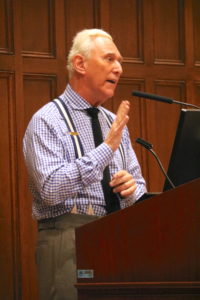By Theodore Schoneman

Upon hearing that Roger Stone was coming to Fordham, I was puzzled. The fact that a university named by The Huffington Post as one of the 10 most anti-free-speech in the country invited someone so closely associated with President Donald Trump was downright shocking. It seemed to me that the college was taking a major step in the right direction. However, at 5:01 p.m. Oct. 10, I became aware that this step forward was matched with a substantial step backwards. Rev Joseph McShane, S.J. president of the university, for whom I have the utmost respect, took it upon himself to issue a statement on Roger Stone’s appearance.
In this statement, he explained that while he supports Stone’s right to come speak at Fordham, he must note that many of Stone’s opinions are “demeaning to others,” “do not rise to the level of thoughtful discourse we expect at Fordham” and are in “stark contrast” with various Jesuit values. With this statement, McShane displays that he is talking the talk of free speech, without walking the walk of fully supporting it.
For a person in a position of power, disparaging the opinions of a speaker is almost as dangerous as not allowing that person to speak at all. People’s thought-process is contaminated by the condemnation before engaging in any discussion at all. This is what occurred with McShane’s statements; they took away the agency of students at Fordham to fairly engage with the ideas Roger Stone would present. Think of it in this manner: we already know the university expects its students to follow Jesuit values. From day one, the concepts of magis, cura personalis and being men and women for others are drilled into the brains of Fordham students.
This is not a bad thing. There is much to be learned from this particular set of values. However, when President McShane adds to that implicit premise that Roger Stone’s ideas do not represent Jesuit values, he is coming to the conclusion that students who shares these views are contradictory to Jesuit values. This is particularly evident because of the broadness and ambiguity of the claim McShane issued. He refers to “many” of Stone’s opinions being against things like the Jesuit values of “men and women for others” and “care for the whole person.” One could fairly ask: which of Stone’s opinions contrast with these values? And, how so? It is certainly possible (if not likely) that some do, but how are we to know without having a reasonable discussion about what opinions Stone holds, and what these values mean in a political context?
Instead of allowing for an open discourse, McShane solves this complex question unilaterally with one swift dash of the keyboard. He states that it is the university’s stance that many of Stone’s opinions are unacceptable to Jesuits. And in hearing this thesis, we as members of the university lose out on the ability to debate, discuss and, possibly, come to a consensus on this topic as mature adults ought to have the right to do. Our leader has made the decision on his own. By granting Stone the right to speak freely at Fordham while condemning him on his beliefs at the same time, the university infringed upon our right to reason freely. It is not that people do not have the right to believe what they wish at this college, but that those who support Stone must do so with the knowledge that they are going against what the university believes.
The ability for each adult at Fordham to come to their own decision, without pressure in one direction, is taken away. Furthermore, because of this, the university as a whole loses its ability to better itself through debate. Debate, after all, is the best method for further understanding. When we want to see who is guilty and who is innocent in a courtroom, we let one person defend on one side, one defend the other and let them debate in an effort to come to the truth. This method can be applied to all truths, and certainly to the matter at hand. By handing down his condemnation of Mr. Stone, Father McShane poisoned the prospect for debate and deprived the student body of the right to search for truth on its own accord. This search for truth is something for which Fordham students should be willing to fight for.
Theodore Schoneman, FCRH ’21, is an economics major from Vienna, Virginia.


































































































































































































